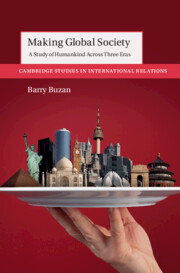Refine search
Actions for selected content:
31 results
Legitimising international orders: The symbolic dimension of surrender
-
- Journal:
- Review of International Studies , First View
- Published online by Cambridge University Press:
- 07 November 2025, pp. 1-20
-
- Article
-
- You have access
- Open access
- HTML
- Export citation
International society as an ontological security provider: a framework for analysis
-
- Journal:
- International Theory , First View
- Published online by Cambridge University Press:
- 03 October 2025, pp. 1-23
-
- Article
-
- You have access
- Open access
- HTML
- Export citation
2 - Great Power Management, International Organizations, and the Promotion of Peaceful Change: 1815 to the Present
- from Part II - Theory
-
-
- Book:
- International Organizations and Peaceful Change in World Politics
- Published online:
- 30 January 2025
- Print publication:
- 06 February 2025, pp 31-54
-
- Chapter
- Export citation
Order as Resilience-Governance of Sameness and Diversity
-
- Journal:
- Ethics & International Affairs / Volume 38 / Issue 2 / Summer 2024
- Published online by Cambridge University Press:
- 22 November 2024, pp. 140-151
-
- Article
-
- You have access
- Open access
- HTML
- Export citation
Agents, multilateral institutions, and fundamental institutional change in international society: The case of Russia’s peacekeeping policy
-
- Journal:
- European Journal of International Security / Volume 9 / Issue 1 / February 2024
- Published online by Cambridge University Press:
- 18 October 2023, pp. 78-96
-
- Article
- Export citation
9 - Conclusions
- from Part IV - Conclusions
-
- Book:
- Making Global Society
- Published online:
- 27 July 2023
- Print publication:
- 10 August 2023, pp 413-426
-
- Chapter
- Export citation
1 - Introduction
-
- Book:
- Making Global Society
- Published online:
- 27 July 2023
- Print publication:
- 10 August 2023, pp 1-50
-
- Chapter
- Export citation

Making Global Society
- A Study of Humankind Across Three Eras
-
- Published online:
- 27 July 2023
- Print publication:
- 10 August 2023
Conceptualizing good global statehood: progressive foreign policy after the populist moment
-
- Journal:
- International Theory / Volume 15 / Issue 1 / March 2023
- Published online by Cambridge University Press:
- 29 September 2022, pp. 79-105
-
- Article
-
- You have access
- Open access
- HTML
- Export citation
An anarchical society (of fascist states): Theorising illiberal solidarism – CORRIGENDUM
-
- Journal:
- Review of International Studies / Volume 48 / Issue 3 / July 2022
- Published online by Cambridge University Press:
- 07 April 2022, pp. 604-605
- Print publication:
- July 2022
-
- Article
-
- You have access
- HTML
- Export citation
8 - Holding the Middle Ground
-
-
- Book:
- Theorizing World Orders
- Published online:
- 18 November 2021
- Print publication:
- 25 November 2021, pp 208-227
-
- Chapter
- Export citation
THE “ENGLISH SCHOOL” OF INTERNATIONAL LAW: SOUNDINGS VIA THE 1972 JUBILEE ESSAYS
-
- Journal:
- The Cambridge Law Journal / Volume 80 / Issue S1 / September 2021
- Published online by Cambridge University Press:
- 06 October 2021, pp. S126-S153
- Print publication:
- September 2021
-
- Article
-
- You have access
- Open access
- HTML
- Export citation
An anarchical society (of fascist states): Theorising illiberal solidarism
-
- Journal:
- Review of International Studies / Volume 48 / Issue 3 / July 2022
- Published online by Cambridge University Press:
- 10 August 2021, pp. 583-603
- Print publication:
- July 2022
-
- Article
- Export citation

Environmentalism and Global International Society
-
- Published online:
- 03 August 2021
- Print publication:
- 15 July 2021
1 - Introduction
-
- Book:
- Environmentalism and Global International Society
- Published online:
- 03 August 2021
- Print publication:
- 15 July 2021, pp 1-12
-
- Chapter
- Export citation
3 - The Idea of Environmentalism
- from Part I - Theory
-
- Book:
- Environmentalism and Global International Society
- Published online:
- 03 August 2021
- Print publication:
- 15 July 2021, pp 45-80
-
- Chapter
- Export citation
11 - Conclusions
- from Part IV - Conclusions
-
- Book:
- Environmentalism and Global International Society
- Published online:
- 03 August 2021
- Print publication:
- 15 July 2021, pp 281-298
-
- Chapter
- Export citation
2 - English School Theory and Global Environmental Politics
- from Part I - Theory
-
- Book:
- Environmentalism and Global International Society
- Published online:
- 03 August 2021
- Print publication:
- 15 July 2021, pp 15-44
-
- Chapter
- Export citation
Football's contribution to international order: the ludic and festive reproduction of international society by world societal actors
-
- Journal:
- International Theory / Volume 14 / Issue 2 / July 2022
- Published online by Cambridge University Press:
- 26 January 2021, pp. 311-337
-
- Article
- Export citation
Chapter 5 - Global Environmental Responsibility in International Society
- from Part III - Environment
-
-
- Book:
- The Rise of Responsibility in World Politics
- Published online:
- 03 December 2020
- Print publication:
- 17 December 2020, pp 101-124
-
- Chapter
- Export citation
